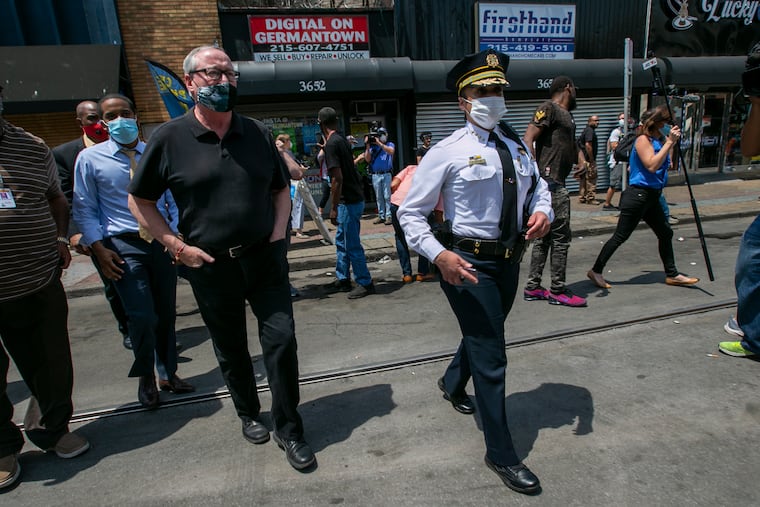Kenney and Outlaw’s failures, outlined in recent report, give Philadelphians more reasons not to trust police | Opinion
The city owes its residents more than mere promises policy brutality will end.

As members of the Community Accountability Council, a group formed to advise City Controller Rebecca Rhynhart’s office during its independent investigation of the police response to protest last summer, we are not shocked by what the report unearthed. The documented decisions around teargassing suggest that police cannot act in the best interests of marginalized communities, that Police Commissioner Danielle Outlaw was ready to use tear gas at the drop of a hat, and that Mayor Jim Kenney has a pattern of being unable to make critical decisions during a tenuous time, often deferring important calls to others under his leadership.
The report puts responsibility on the shoulders of the mayor, citing the overblown use of force used on protesters and others. It noted that Kenney knew about Commissioner Outlaw’s previous use of tear gas during her time as commissioner in Portland, Ore., and found that on May 31, Kenney said that while he didn’t personally support using tear gas, the decision was up to Outlaw. No officer interviewed for this investigation recalled this munition being used in Philadelphia since the city’s bombing of the MOVE Black liberation group.
Kenney’s consent to these harsh tactics — 35 years after the MOVE firebombing devastated a Black neighborhood — added to a pattern of state violence that historically impacts marginalized communities. While white vigilantes, deputized by privilege, freely assembled in Fishtown and at South Philadelphia’s Marconi Plaza, protesters, children, and other residents of the historically Black neighborhood at 52nd and Market Streets were shot with rubber bullets, and tear gas went beyond the streets reported to be impacted, entering homes through windows.
The mayor previously defended the use of the caustic agent, which can cause enduring health problems after exposure, offering statements of regret only after the New York Times published a damning video recreation of the excessive force used on protesters on June 1. But these statements didn’t undo the injury to Philadelphians who stood up for Black lives, with the incidents adding to the city’s long history of racist policing against Black Philadelphians.
In June, following the unrest, Outlaw stated that she would put a moratorium on tear gas, and Managing Director Brian Abernathy, whose oversight included the Police Department, stepped down in July. Then in October, City Council voted to ban the use of tear gas and rubber bullets in demonstrations. The mayor signed their bill in November, saying the Police Department must establish a policy to prohibit the use of chemical weapons or rubber bullets on “any individual engaging in First Amendment activities.”
All of these actions suggest some recognition that the city’s aggressive tactics were unacceptable and the handling of the protests indefensible. Yet, last Thursday, Commissioner Outlaw defended her leadership in her press briefing following the controller’s investigation. The Mayor’s Office also reacted defensively to the report, saying it contains “unsubstantiated claims.” But those responses sound like attempts to deflect responsibility. And we’re still waiting on a public announcement of any new Police Department policy around tear gas.
Kenney’s choice to give Commissioner Outlaw decision-making power over the call about whether or not to use tear gas on I-676, at 52nd and Market Streets, and in Kensington is a glaring problem that requires more accountability than we’ve so far seen. The mayor has failed in his management of the Police Department.
The controller’s report can and should reignite civilian demands for community control of policing, and accountability for state violence like deployed tear gas. Our mayor’s passive green light of chemical agents associated with human rights violations and lack of leadership since, alongside questionable budget choices from City Council, has not met a demand of this moment: defund the police and redirect the money to community needs. Instead, police were allocated millions of unscheduled funds to pay for overtime and permitted the unplanned purchase of Tasers as munitions — all while public health and service professionals still struggle to gain access to PPE during a global pandemic, and following yet another police killing of a Black man, Walter Wallace Jr., in October.
» READ MORE: Danielle Outlaw’s failure should push Kenney to ask for her resignation — but she didn’t fail alone | Editoria
Mayor Kenney’s lack of decision-making is jarring and has created an environment ripe for unrest. We agree with Ernest Owens’ calling in Philadelphia Magazine for Kenney and Outlaw to resign, even though Outlaw rejected the idea at last week’s press conference and Kenney has stayed silent on the matter. Philadelphians should at least be able to trust that leaders will make good on promises to correct past mistakes, not attempt to justify them months after the fact.
We echo the recommendations from the controller’s report for enhanced policies around the use of less-lethal munitions in responding to civil unrest, to make the recently passed City Council ordinance a reality. If we can’t hold electeds accountable, our collective healing can’t happen. True leadership means leaving when it’s time — and at minimum, reversing tactics that have failed.
Abdul-Aliy Muhammad is an organizer and writer born and raised in West Philadelphia. @MxAbdulAliy. Amelia Carter is a founding member of Penn Community for Justice. She is from Philadelphia and lives on 52nd Street. @Pennforjustice